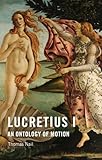Lucretius I : An Ontology of Motion / Thomas Nail.
Material type: TextPublisher: Edinburgh : Edinburgh University Press, [2022]Copyright date: ©2018Description: 1 online resource (288 p.) : 15 B/W illustrationsContent type:
TextPublisher: Edinburgh : Edinburgh University Press, [2022]Copyright date: ©2018Description: 1 online resource (288 p.) : 15 B/W illustrationsContent type: - 9781474434669
- 9781474434683
- 187 23
- PA6484 .N35 2018
- PA6484 .N35 2018
- online - DeGruyter
| Item type | Current library | Call number | URL | Status | Notes | Barcode | |
|---|---|---|---|---|---|---|---|
 eBook
eBook
|
Biblioteca "Angelicum" Pont. Univ. S.Tommaso d'Aquino Nuvola online | online - DeGruyter (Browse shelf(Opens below)) | Online access | Not for loan (Accesso limitato) | Accesso per gli utenti autorizzati / Access for authorized users | (dgr)9781474434683 |
Browsing Biblioteca "Angelicum" Pont. Univ. S.Tommaso d'Aquino shelves, Shelving location: Nuvola online Close shelf browser (Hides shelf browser)

|

|

|

|

|

|

|
||
| online - DeGruyter The United States Through Arab Eyes : An Anthology of Writings (1876-1914) / | online - DeGruyter The Schelling-Eschenmayer Controversy, 1801 : Nature and Identity / | online - DeGruyter Wrongful Damage to Property in Roman Law : British Perspectives / | online - DeGruyter Lucretius I : An Ontology of Motion / | online - DeGruyter Seeing God in Sufi Qur’an Commentaries : Crossings between This World and the Otherworld / | online - DeGruyter Challenging Cosmopolitanism : Coercion, Mobility and Displacement in Islamic Asia / | online - DeGruyter British Music Videos 1966 - 2016 : Genre, Authenticity and Art / |
Frontmatter -- Contents -- A Note on the Translation and Text -- Acknowledgements -- Introduction -- Book I -- 1. The Birth of Venus -- 2. Love and War -- 3. Religion -- 4. The Flows of Matter -- 5. The Pores of Matter -- 6. The Event -- 7. The Folds of Matter -- 8. The Emancipation of the Senses -- 9. The Infinity of Matter -- Book II -- 10. The Motion of Matter -- 11. The Swerve -- 12. The Form of Matter -- 13. Morphogenesis -- 14. The Sensation of Matter -- 15. The Multiverse -- Lucretius: Our Contemporary -- Index
restricted access online access with authorization star
http://purl.org/coar/access_right/c_16ec
The most original and shocking interpretation of Lucretius in the last 40 yearsA new materialist, quantum and feminist interpretation of LucretiusArgues the original and provocative thesis that Lucretius was not an atomist but rather the first philosopher of motionThe most profound revision of how we read Lucretius since Michel Serres’ The Birth of Physics (1977)Luretius II launch offerFind out where it all started: we're offering a free ebook of Lucretius I when you buy a copy of Lucretius II. Just add a copy of Lucretius II (paperback, hardback or ebook) and a Lucretius I ebook to your basket, and enter the code Lucretius2 when you check out.Visit the webpage for Lucretius IIThomas Nail argues convincingly and systematically that Lucretius was not an atomist, but a thinker of kinetic flux. In doing so, he completely overthrows the interpretive foundations of modern scientific materialism, whose philosophical origins lie in the atomic reading of Lucretius’ immensely influential book De Rerum Natura.This means that Lucretius was not the revolutionary harbinger of modern science as Greenblatt and others have argued; he was its greatest victim. Nail re-reads De Rerum Natura to offer us a new Lucretius – a Lucretius for today."
Mode of access: Internet via World Wide Web.
In English.
Description based on online resource; title from PDF title page (publisher's Web site, viewed 29. Jun 2022)


